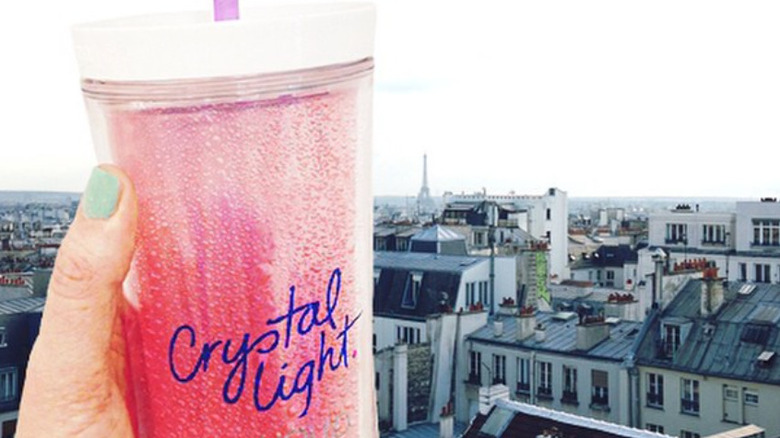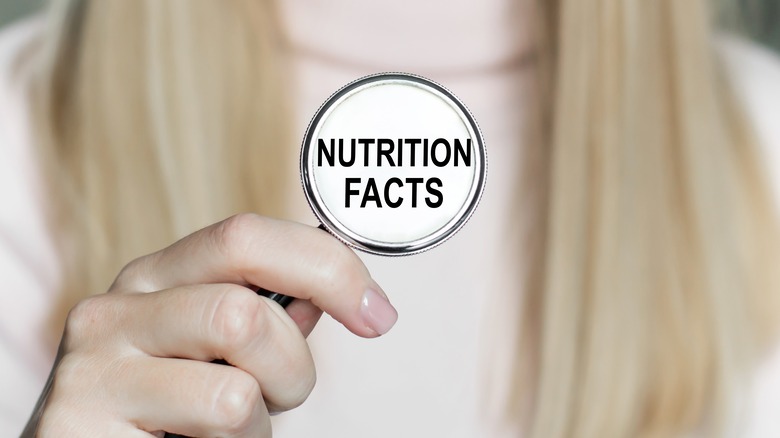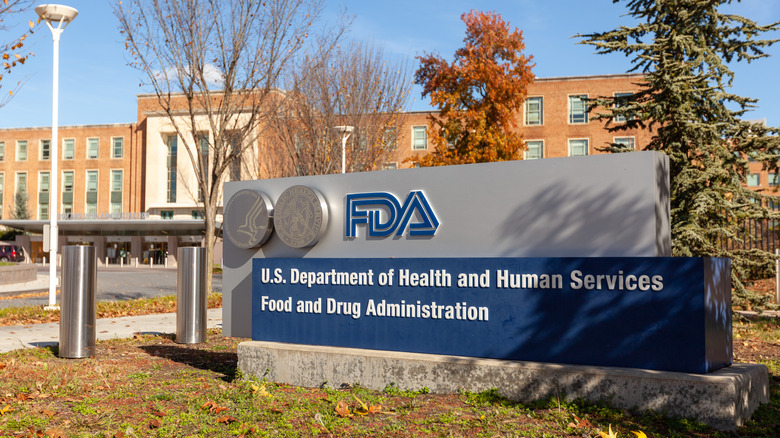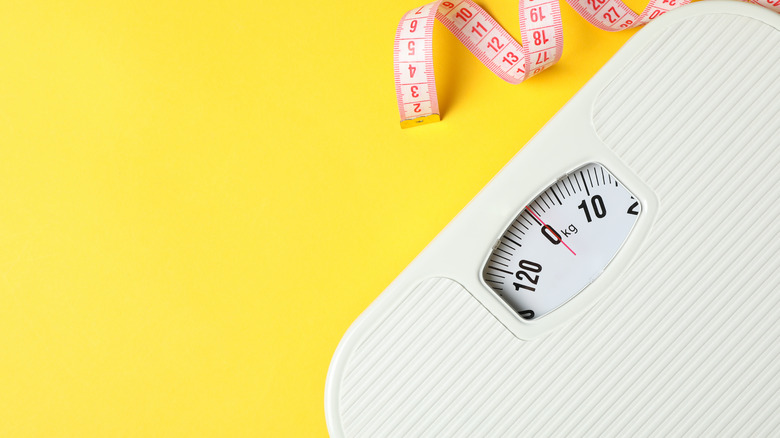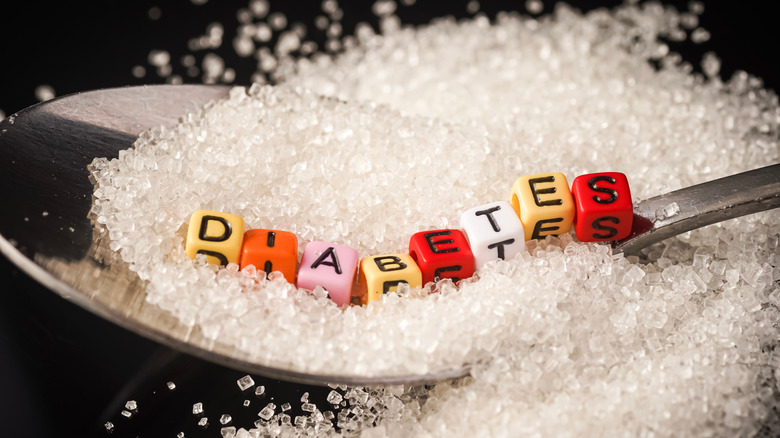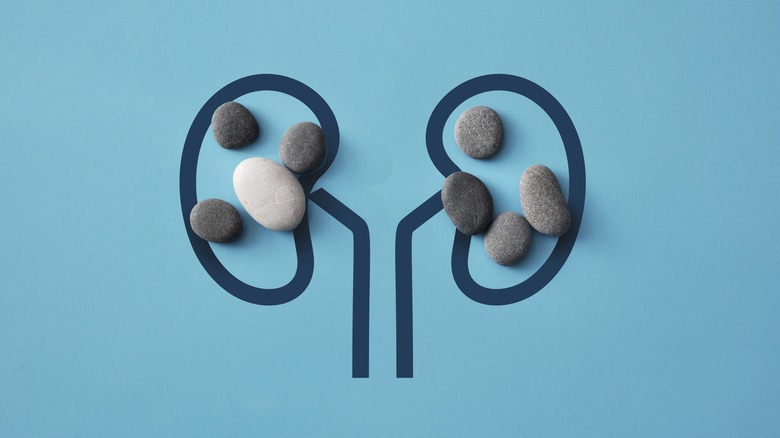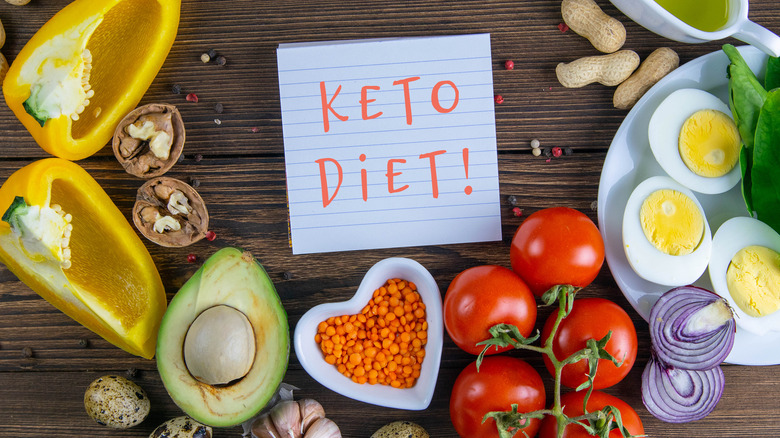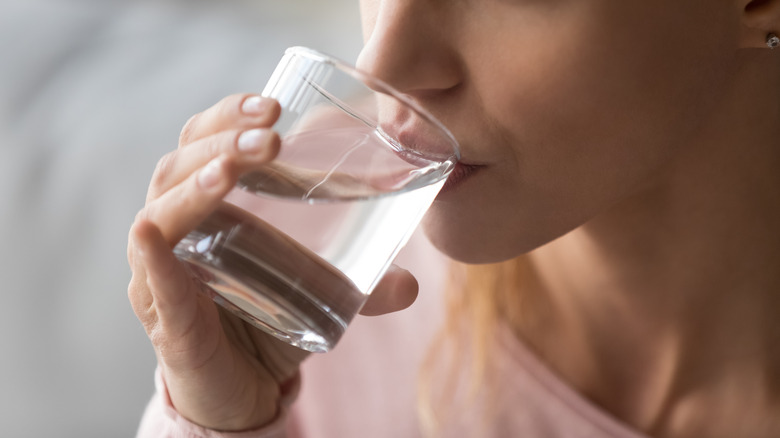Crystal Light: Is It Bad For You?
Crystal Light was first introduced to the masses in 1982 with five flavors — and now there are over five times that many, including their original classic flavors, tea flavors, some that include caffeine, and their "Pure" line (via Crystal Light). A representative for the brand said Crystal Light was always marketed as a "better-for-you" option, one that would induce drinkers to stay adequately hydrated by providing an appealing flavor to their boring old water, according to The New York Times. But is this true? Is Crystal Light really better for you than other beverages? Here's what we found.
For those who are unfamiliar with the product, Crystal Light is a flavored powder that is supposed to be mixed with water. It adds flavor without a lot of calories, states Healthline. It comes in powder form as well as a ready-to-go pre-mixed drink. And although the different types and flavors vary in the amount of calories, the basic ingredients are relatively the same.
It can help with hydration
Let's face it. Even though drinking water is a great way to stay properly hydrated, glass after glass of it can be unappetizing. Adding flavor to you water, however, can make it more appealing. And when you consider that Crystal Light comes in multiple flavors, it becomes clear how it could help encourage more water consumption and, in the process, better hydration.
As Healthfully notes, classic Crystal Light is only five calories a serving and has come in a variety of flavors like fruit punch, raspberry, strawberry kiwi, lemonade, and orange. Additionally, there's been a couple of varieties of iced tea: lemon and peach. They also have a line of mocktail flavors like appletini, margarita, and mojito. And then there's Crystal Light Pure, which does have more calories (15 per serving) but doesn't contain the same sweeteners as other Crystal Light products. Flavors of Crystal Light Pure have included strawberry kiwi, mixed berry, and grape.
While Crystal Light isn't loaded with calories, it can contain sodium, according to Healthfully. Granted, there are no-sodium Crystal Light products. However, the U.S. Department of Agriculture (USDA) lists that 2 grams of Crystal Light can contain 35 milligrams of sodium. So, before you try any type of Crystal Light, read the Nutrition Facts Label.
It's not a nutrient-packed choice
From oranges to bananas and everything in between, fruits are packed with vitamins and minerals. Unfortunately, just because a food tastes like fruit doesn't mean it has all the same nutritional qualities. But what about Crystal Light?
Well, like the scientific community, let's do a little research and compare two similar products. According to the USDA, lemonade in powder form contains minerals like magnesium, manganese, calcium, iron, phosphorus, potassium, zinc, and copper. It also has vitamins like niacin, thiamin, and pantothenic acid, as well as vitamins E and B6. However, the USDA doesn't list any of those nutrients for Crystal Light Pure's Lemonade drink mix. In fact, the USDA doesn't list any vitamins or minerals for this product. And Crystal Light Pure Lemonade does have more sodium than the lemonade powder. On the other hand, the Crystal Light Pure Lemonade does have less sugar than the powdered lemonade. All that said, fresh fruit is probably always a healthier choice than a fruit-flavored beverage or juice.
It can contain artificial colors
If you read the ingredients on a food's Nutrition Facts Label and see listed the name of a color followed by a number, then that particular product uses an artificial color. And, yes, as Healthline notes, some Crystal Light products that use artificial colors like Blue 1, Yellow 5, and Red 40.
Now let's be clear. The Food and Drug Administration (FDA) regulates artificial colors and has categorized artificial colors like the three mentioned above as safe under these regulations (via Healthline). That doesn't mean, however, that there aren't concerns about artificial colors. For instance, one 2004 meta-analysis published in the Journal of Developmental and Behavioral Pediatrics found that there does seem to be an association between food dyes and hyperactive behavior in children, though as Healthline notes, other research has suggested that genetic factors may play a role in this reaction, and that children seem to react with varying degrees of sensitivity.
Additionally, there is some concern that certain artificial colors –particularly Blue 2 and Red 3 — might be carcinogenic (via Healthline). However, more research is needed. The bottom line is we're still learning about these and other artificial colors.
Check the label for artificial sweeteners
Besides artificial colors, another group of ingredients to keep an eye out for when it comes to Crystal Light are sweeteners, via Healthline. And as with artificial colors, there is debate and concern about these ingredients.
One type of artificial sweetener found in some Crystal Light products is sucralose. More research is needed regarding sucralose's potential impact on humans, per MedicineNet. However, sucralose does contain chlorine, which is categorized as a carcinogen. Plus, short-term animal studies point to sucralose potentially causing problems like hives, heart palpitations, gas, mood swings, and nausea. Besides sucralose, Crystal Light can contain aspartame. The Food and Drug Administration (FDA) regulates both sucralose and aspartame and has deemed them safe under their regulations. There is, however, one notable exception. Since aspartame contains the amino acid phenylalanine, the FDA cautions patients with phenylketonuria (PKU) to avoid aspartame, since PKU makes it harder to process phenylalanine.
Additionally, stevia, which is a sweetener that comes from the stevia plant, is used in Crystal Light Pure products (per Healthline). Different medical and health sites refer to stevia as an artificial sweetener, a natural sweetener, or a zero-calorie sweetener. But however you categorize it, Medical News Today cautions that certain medical conditions (like ones that affect the heart) and medications (like steroids) can raise one's chances of experiencing potential stevia-related side effects like lower blood pressure.
Does Crystal Light cause weight gain?
Since Crystal Light is a low-calorie drink, it might seem like a good addition for a weight management diet. But not so fast. There have been some mixed findings regarding the sweeteners found in different Crystal Light products and weight gain.
According to Medical News Today, when we process aspartame, it breaks down into several components, including the amino acid phenylalanine. However, research involving mice shows that phenylalanine can inhibit an enzyme called intestinal alkaline phosphatase (IAP). This has the potential to increase the chances of health concerns like obesity and type 2 diabetes. Also, research on hamsters published in the Journal of Food and Nutrition Research found a possible connection between consuming aspartame and increased hunger, which, of course, can make weight management more difficult — though additional research is needed to confirm a similar effect in humans. In addition, Forks Over Knives points out that the sweet nature of artificial sweeteners can trick one's brain into thinking it's taking in large amounts of sugar, which in turn can make you crave more sugar. Findings from research published in Appetite supported this, concluding that participants who drank artificially sweetened Sprite Zero were more likely to eat candy.
There's also data regarding other sweeteners in Crystal Light and blood sugar levels. The American Diabetes Association found a connection between sucralose consumption in obese individuals and blood sugar and insulin spikes. So, if you're looking to craft a weight management meal plan (or would like to fine tune an existing one), you might want to work with a dietitian and discuss factors like specific products and portion control.
Crystal Light and diabetes
As the Mayo Clinic explains, diabetes mellitus, or diabetes, is actually the umbrella term for more than one disease. The common factor, however, is that these conditions have to do with your blood sugar or glucose. Your body uses the hormone insulin to help your cells take in glucose, which can supply them with energy (via American Diabetes Foundation). But issues with your body's production and/or use of insulin can lead to larger amounts of glucose winding up in the blood, which in turn can cause health issues.
Since managing one's glucose is a major aspect of diabetes, does that make Crystal Light a good option for diabetics? Well, as WebMD points out, research on sweeteners like the kinds used in Crystal Light products and diabetes has been contradictory. For example, a study in Diabetes Care found that participants who increased their daily artificially sweetened beverage intake by half a serving were more likely to develop diabetes. Yet the Pasadena Health Center recommends Crystal Light instead of soda for their diabetic patients, especially in the summer. Health also says Crystal Light is a better choice than soda and energy drinks for type 1 diabetics.
The bottom line is the scientific community is still exploring artificial sweeteners and diabetes. So, you should work with a health care professional to determine if Crystal Light is good for your personalized diabetic-friendly diet.
Crystal Light might help with a type of kidney disease
Did you know that kidney stones are a form of kidney disease (via National Kidney Foundation)? What's more, there's more than one type of kidney stone. For example, uric acid stones can form from (you guessed it) high amounts of uric acid in your urine (per National Kidney Foundation). However, Crystal Light might help with this medical issue.
According to the University of Chicago, increasing the pH of one's urine can decrease the chances of developing uric acid kidney stones. Now, this can be accomplished by taking potassium citrate tablets. Multiple medical sources, however, state that Crystal Light Lemonade can help lower the pH of urine and in the process decrease the chances of developing uric acid stones. The Kidney Dietitian says that Crystal Light Lemonade is in general more effective at changing the alkalinity of urine than diet lemon lime soda, despite the soda's citrate content. HTX Urology touts Crystal Light diet lemonade packs to prevent stones. And the University of Chicago notes that a liter of Crystal Light Lemonade is the equivalent of two potassium citrate tablets when it comes to its effect on urine pH.
Of course, if kidney stones are a concern for you, you should speak with your healthcare professional before adding Crystal Light to your diet. And as Portneuf Medical Center points out, proper hydration with water is still the number one way to lower your chances of developing kidney stones.
Crystal Light and the keto diet
Chances are you've heard of the keto diet. Or should we say a keto diet, since there is more than one version of it. So, to avoid any confusion, let's do a quick refresher. As Healthline explains, the "keto" diet is short for the ketogenic diet. And while there is more than one type, a basic hallmark of it is consuming lower amounts of carbohydrates and higher amounts of fat. One's protein intake is also guided in a keto diet, with different diets specifying moderate to high levels. The result is the energy source for one's body changes, which in the process might help with weight management.
Since taking in fewer carbohydrates is an important part of the keto diet, wouldn't Crystal Light be a good addition for a keto-friendly meal plan? After all, as Perfect Keto points out, there are Crystal Light products that don't contain carbs. Well, let's explore this with the Standard ketogenic diet (SKD) which, as the Indian Journal of Medical Research explains, typically specifies that a person should consume 70% fat, 20% protein, and 10% carbs. Technically, drinks that contain few to no carbs can fit into the Standard ketogenic diet.
So, yes, when compared to beverages that are loaded with carbs, Crystal Light is a better option. But Perfect Keto advises that the artificial ingredients found in classic Crystal Light products makes them a less healthy choice than other keto-friendly beverages.
Water is still your best option
When it comes to staying hydrated, water remains the king. The Centers for Disease Control and Prevention (CDC) note that water is important for a number of bodily needs like keeping the joints properly lubricated, removing waste, supporting your spine's good health, and maintaining the right body temperature. And while you can get water from foods and drinks like Crystal Light, there are other ways to hydrate.
For example, the CDC recommends adding a lemon or lime wedge to water, which not only adds some of those fruit's benefits, but also a little flavor. In addition, you could opt for seltzer water (a.k.a. carbonated water or sparkling water), per WebMD. As a matter of fact, seltzer might be good for health issues like constipation, irregular bowel movements, and stomach pain. Furthermore, seltzer can be a good substitute for sodas when it comes to dental health and weight management. However, it can be a bad choice for someone with gastroesophageal reflux disease (GERD).
So, what's the right drink then for you? Well, clean water in the right quantities is a staple of a healthy diet. As for Crystal Light, it has its good points as well as not-so-healthy qualities. Whether or not it should be a part of your diet, how much of it you should drink, and what Crystal Light products are best for you is something you should discuss with your healthcare professional.

